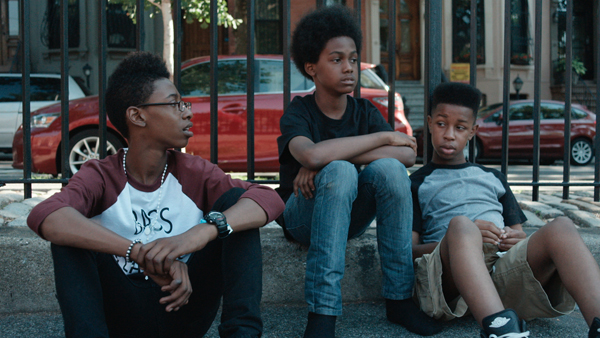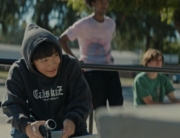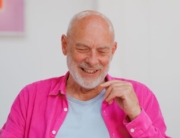There is a price to be paid for success at a young age, and often it is a crushing sense of alienation or overwhelming pressure to live up to expectations. The 13-year-old subjects of this in-depth documentary about the heavy metal band Unlocking the Truth seem like contenders to learn that lesson. Though not even old enough to attend high school, they received significant media attention after signing a $1.8 million recording deal.
The group originates from Brooklyn’s Flatbush neighborhood, where despite the dominance of hip-hop, the three bandmates and friends grow up as aspiring purveyors of heavy metal music: guitarist Malcolm Brickhouse, drummer Jarad Dawkins, and bassist Alec Atkins. Malcolm’s parents, Noreen and Tracey, have encouraged the boys in what started out as a hobby that eventually grew into performances on public street corners. When a video of the kids goes viral, it grabs the attention of Alan Sacks, a former television producer.
Recognizing their potential, Sacks puts his weight behind them, and before long they’ve landed a contract with Sony Music, which immediately raises the stakes for the band. Suddenly, there is pressure to play high-profile festivals, make media appearances, and otherwise start building a brand. Malcolm, Jarad, and Alec express sporadic excitement over logos and costumes, but after a while they start tuning out the grown-ups and playing video games instead of paying attention. At least their enjoyment shines through when performing in front of a live audience, and their energy does seem infectious, based on how the crowds bang their heads along.
While all three kids have trouble growing into their rock star shoes, it seems toughest on Malcolm, who becomes pressed into singing duties. Needing to get his voice in better shape, he starts seeing a vocal coach whose job is to train him to belt out his lyrics more forcefully (in a manner a little reminiscent of Metallica’s James Hetfield). Malcolm also seems the most resentful at having to give up certain youthful pleasures, such as skateboarding, since Noreen and Alan fear how a broken arm could derail his musical career.
As viewers, we can empathize with these kids, who discover that life as rock stars is not all fun and games. But at the same time, their inability to behave during meetings or to heed the adults’ advice—yes, Malcolm continues to skateboard, and yes, there is an unexpected visit to a hospital emergency room—proves they aren’t emotionally ready for the money, public adoration, and responsibility thrust upon them. But then again, they are in their early teens. If kids their age were built for this kind of stardom, they wouldn’t need to have legal guardians or agents like Alan, would they?
In a different kind of music documentary, a slow slide into self-destruction and dissolution might set in about now. But what gets these kids through this tricky period is the grounding influence of friends and family. For example, following the band’s stint on the road, Jarad’s mother still makes him fold laundry, despite his newfound fame and money. Alec, meanwhile, has classmates who swear loyalty to him, despite their different musical tastes. At one point, Alan admits that he has more of a bond with the three than with his biological children.
Eventually, all parties turn their attention towards recording the first single, “Monster.” But perhaps what’s even more important is that Malcolm, Jarad, and Alec start to mature and show signs of better comprehending how factors such as politics play into the popularity of their band. During a discussion on whether fan interest in Unlocking the Truth could be politically motivated, as certain media pundits contend, Malcolm and Alan have what nearly amounts to a grown-up conversation.
Overall, more emotional growth than career development takes place in Breaking a Monster, so those expecting it to close with the band on top of the world may be disappointed. Then again, it’s hard to imagine any movie centered on teens achieving a satisfying three-act structure. For many of us, what did those years represent other than a first act?







Leave A Comment